Night Sweats and Frequent Peeing
Several different conditions can cause night sweats and frequent nighttime urination. Of course, this article should not be used in place of a doctor's analysis, and you should see your primary doctor regarding any health concerns that you might have. Please only use this for research purposes. With that said, here are some of the conditions which can cause the aforementioned symptoms:
Diabetes, specifically type 2, can cause frequent urination and night sweats. Night sweats are caused by a drop in blood sugar, which can frequently occur during the night for people with diabetes. With diabetes, you also develop an increased need to pee because there is too much glucose in the body for the kidneys to keep up with. Because they're failing to keep up and the body still needs to get rid of all of the excess glucose, it is excreted through urination.
Other symptoms of diabetes are weight loss, extreme thirst or hunger, tingling or numbness in limbs, sudden weight loss, exhaustion, slow healing wounds, dry mouth, and headaches.
Urinary tract infections could also be the cause of night sweats and frequent nighttime urination. A urinary tract infection is an infection that can show up in any part of the urinary system, which is made up of the bladder, kidneys, urethra, and ureters. When bacteria from this infection accumulate in the bladder, it can cause swelling and increase the urge to urinate. Night sweats with other signs of a UTI can mean that the infection has moved into the kidney. You should contact your doctor if you have a UTI and begin to develop night sweats, a fever, or chills.
Urinary tract symptoms besides frequent peeing and night sweats are pain or burning while urinating, constantly feeling the need to pee, pressure or cramping in the lower abdomen, bloody or cloudy urine, and strong-smelling urine.
Another possible cause behind night sweats and frequent nighttime urination is bladder cancer. Bladder cancer is generally transitional cell carcinoma, which means that cells in the bladder's transitional tissue allow it to expand, grow out of control and become a tumor. Night sweats often occur with cancers of all kinds, although the reasoning behind why is not entirely clear. Frequent urination is caused by the bladder being irritated by the tumor and being unable to hold as much urine as it previously was.
Bladder cancer can also present with blood in the urine, painful urination, and pain in the lower back.
In the case of diabetes and bladder cancer, night sweats are often chronic. Chronic night sweats can make sleeping extremely difficult and lead to sleep loss over time, so it is essential that efforts are made to alleviate the symptoms. The best way to relieve night sweats is to address the bedroom. Using light comforters or quilts and breathable sheets can keep the body cool. The best way to truly reduce night sweats is to keep the bedroom nice and cold. This is generally achieved through the use of air conditioning; however, this can get pricey, especially during the summer. The BedFan is a less expensive and proven way to relieve night sweats by blowing cool air directly over the body and under the sheets.
Share

